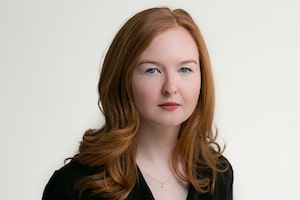
Police near a damaged van in Toronto after it was driven on a sidewalk, crashing into a number of pedestrians on Monday, April 23, 2018.Aaron Vincent Elkaim/The Canadian Press
Months after the Toronto van attack, Alek Minassian said he was “happy” about the mass killing though he had wished there’d been more female victims, according to a psychiatrist who testified at his murder trial Wednesday.
Eight women and two men were killed and 16 other people were injured when Mr. Minassian, then 25, drove a rental van down the sidewalk of Toronto’s busy Yonge Street on April 23, 2018. Now on trial, he does not deny he planned or carried out the mass killing. But his defence team argues that he should not be held criminally responsible, because his autism spectrum disorder (ASD) made him unable to understand on a rational level that what he was doing was wrong.
Dr. Rebecca Chauhan took the stand at his trial Wednesday, which is being held virtually as a result of the COVID-19 pandemic.
The Hamilton-based forensic psychiatrist, who specializes in child and adolescent psychiatry, met with Mr. Minassian on three occasions in September, 2018. She also met once with his parents.
Dr. Chauhan said she found that he had difficulty grasping his own emotions, as well as other people’s, which she described as a sort of “mind blindness.”
His biggest impairment or deficit, she said, seemed to be in his social interaction skills, which “stood in stark contrast to his intellectual ability.”
She described that, during their meetings, Mr. Minassian’s eye contact fluctuated from non-existent to intense and “unnerving.” His delivery was flat, and though he often gave one-word responses to her questions, she said he spoke surprisingly “freely” about the attack itself.
“He had talked to me about back in high school, for instance, in the context of sometimes feeling hopeless or bullied, this idea of fantasizing about – and again, these are his words – mass murders,” she said.
He then told her about “stumbling across” a manifesto written by Elliot Rodger in 2016, while searching online for “spree killers.”
Mr. Rodger, who killed six people and then himself in Santa Barbara, Calif., in May, 2014, brought the toxic “incel” (short for involuntarily celibate) subculture into the public eye. It is a predominantly online network of men who blame women for their inability to find sexual partners.
By late 2017, after a brief stint in basic military training, Mr. Minassian became “obsessed” with the manifesto, Dr. Chauhan said, relating particularly to an “intense fear of being rejected by females.”
This hyper-fixation, Dr. Chauhan told the court Wednesday, was “sort of a pattern throughout [Mr. Minassian’s] life,” and one that she believed he would have been vulnerable to as a result of his ASD. However, she found there was no emotional attachment to this “preoccupation.”
It was as if he fixated on the things he had in common with Mr. Rodger, she said, rather than a shared emotional state. “Not even anger. He doesn’t describe feeling jilted or angry at other people. It’s more about himself.”
He was thinking, he told her, that people who thought he was “nothing” would think, “Oh, Alek Minassian managed to kill a lot of people.”
Despite booking the van three weeks in advance, Mr. Minassian carried on with his studies – completing exams the day before the attack.
“I need to follow plans from beginning to end,” Dr. Chauhan said he told her.
Court heard Wednesday that Mr. Minassian attempted suicide in jail after his arrest, and was deemed by Dr. Chauhan to be a suicide risk.
He recalled that during the attack, “he realized he was hitting random people. But that in his mind – and these are his words – [he was] wishing for more female victims.”
When she asked him in September how he felt about the attack, he said he was “happy” that he had been able to get attention.
“It may not have gone exactly the way he wanted it to,” she said, noting that he expressed some disappointment about still being alive. “But in general he did say he thought it was worth it, and he used the term ‘being happy.’”
Defence lawyer Boris Bytensky asked Dr. Chauhan if his client, Mr. Minassian, knew that it was against the law to kill people.
“He absolutely knew it was against the law,” she said.
Mr. Bytensky also asked her if he appeared remorseful in any way. She said he did not.
Our Morning Update and Evening Update newsletters are written by Globe editors, giving you a concise summary of the day’s most important headlines. Sign up today.
 Molly Hayes
Molly Hayes